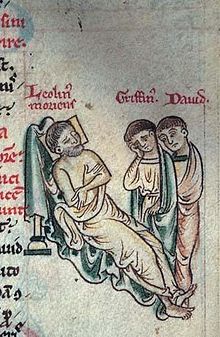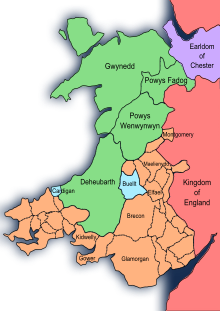Dafydd ap Llywelyn
Dafydd ap Llywelyn (* around 1215 , † February 25, 1246 ) was a prince of Gwynedd . He succeeded Llywelyn from Iorwerth , but his fight against the English king failed in the War of 1241 and in the War of 1244 , during which he died.
Origin and youth
He was probably born around 1215 as the only legitimate son of Prince Llywelyn from Iorwerth and his wife Johanna , an illegitimate daughter of King Johann Ohneland . Contrary to the usual Welsh inheritance law, the royal justiciar Hubert de Burgh , Archbishop Stephen Langton and the papal legate Pandulf approved the leading representatives of the underage King Henry III. , in May 1220 in Shrewsbury that the legitimate Dafydd would become his father's main heir in place of his older, illegitimate brother Gruffydd . In 1222 this was made by Pope Honorius III. confirmed that in 1226 the illegality of the birth of Dafydd's mother Johanna was canceled. In the same year, the leading Welsh princes confirmed Dafydd's claim to succession. His father hoped that his son, as the nephew of the English king , would be recognized by him as the overlord of Powys and Deheubarth , which he himself was denied. In 1229 Dafydd paid homage to the king . In 1228 he was betrothed to Isabel, a daughter of the Marcher Lord William de Braose . Llywelyn ab Iorwerth, however, left Braose hanging for adultery with his wife Johanna in 1230, but Dafydd and Isabel were probably married before the end of 1232, and Llywelyn occupied the Builth estate , which Isabel had inherited from her father, and destroyed Builth Castle .
Early career
From 1231 Dafydd, temporarily together with his mother or with Ednyfed Fychan, the seneschal of his father, with diplomatic negotiations with King Henry III. entrusted. In the face of his father's attacks on the Welsh Marches between 1231 and 1234 and his support for the rebellious Richard Marshal , Earl of Pembroke, the King repeated his willingness to conclude not just an armistice but a peace treaty with the Prince of Gwynedd. However, only one ceasefire was reached in the negotiations. After his father presumably suffered a stroke in 1237, Dafydd had the chance to reach a permanent agreement with the English king. To clarify his succession again, Llywelyn called in 1238 the Welsh princes to a meeting to pay homage to Dafydd. Henry III. Dafydd, Gruffydd and the Princes of Deheubarth and Powys then expressly forbade this ceremony. There was only one meeting of the Welsh princes in Strata Florida Abbey , where they pledged their allegiance to Dafydd. Dafydd, however, stripped his brother Gruffydd from administration of occupied Powys Wenwynwyn and restricted his rule to the Lleyn Peninsula .
Succession to his father and submission to the English king
After the death of Llywelyn on April 11, 1240 Dafydd paid homage to the king on May 15 in Gloucester as Prince of Gwynedd. Dafydd was allowed to wear a princely crown at this meeting and was knighted by the king , but the ceremony became a humiliation for Dafydd. The king regarded Dafydd as a vassal and affirmed that the smaller Welsh princes may only pay homage directly to him and not to the prince of Gwynedd. Furthermore, open border conflicts were settled with the Marcher Lords, Dafydd had to hand over the principality of Powys Wenwynwyn, which had been occupied by his father since 1216, to an arbitration commission. The terms and concessions on Dafydd's homage had so undermined his position that his succession was called into question. Presumably in the fall of 1240, he took his brother Gruffydd and his son Owain prisoner and imprisoned them in Criccieth Castle . In addition, he was able to consolidate his power in Gwynedd with the support of Ednyfed Fychan and other leading nobles. However, the Anglo-Norman Marcher Lords took advantage of the weakness of the previously dominant Welsh principality and began to occupy smaller Welsh dominions in Ceredigion, Maelienydd or Meisgyn. Since Dafydd could not tolerate these attacks, border conflicts arose. Then Heinrich III planned. a campaign to Gwynedd for the summer of 1241. Instigated by Gruffydd's wife Senana, who campaigned for her husband's release and inheritance rights, Henry III planned. To share Gwynedd and to grant Gruffydd part of his father's realm. It was now evident that Dafydd had lost his supremacy over the other Welsh princes. Since they had already paid homage to the English king after the death of Dafydd's father, they refused to support Dafydd and advocated a division of Gwynedd's inheritance. Dafydd was outmaneuvered in August 1241 by the royal army, which occupied the Perfeddwlad region between the Conwy and the Dee from Chester and cut off from the possibility of retreat over the Conwy and into the mountains of Snowdonia . Without the possibility of further resistance, Dafydd had to surrender on August 29, 1241 in Gwern Eigron on the banks of the Elwy near St Asaph . He had to hand his brother over to the king and assure him that he would accept the royal court's ruling on an inheritance division. According to the king's plans, Dafydd was to receive Tegeingl in northeast Wales between the River Clwyd and the River Dee. In Meirionydd Dafydd had to accept the rule of Llywelyn Fawr, a son of Maredudd ap Cynan from a branch of his family. Two days later, Dafydd in Rhuddlan had to agree to submit to an ecclesiastical court if he would break his allegiance to the king and that a breach of allegiance would call his succession as a whole into question. In the autumn he had to acknowledge that his kingdom would fall to the king if he did not leave male heirs. Dafydd had thus lost everything within a year that his father had achieved since the wars with King John from 1212. Dafydd's humiliating defeat affected other Welsh territories as well. In Powys Wenwynwyn, Gruffydd ap Gwenwynwyn , the son of Prince Gwenwynwyn, who had been driven out by Dafydd's father, was installed as the king's feudal vassal, the Welsh Prince of Maelienydd submitted to the king, and Cardigan and Builth fell to the crown. In September 1241, Dafydd's brother Gruffydd was brought to the Tower of London , but Henry III. made no attempt to partition Gwynedd, but instead used his hostage as leverage on Dafydd. In 1243 and 1244, Dafydd was supposed to appear before the royal court for violating the peace, but he was excused for illness. Gruffydd's son Llywelyn ap Gruffydd has since become lord of Dyffryn Clwyd , a region that was originally to be part of Dafydd's part of Gwynedd.
Resistance to the King and Death
On March 1, 1244, Gruffydd had a fatal accident while trying to escape from the Tower. With that the king had lost his leverage over Dafydd, and Dafydd declared himself his brother's avenger. He quickly formed an alliance with most of the other Welsh princes to oppose English domination. Only Morgan ap Hywel of Gwynllŵg and Gruffydd Maelor ap Madog and Gruffydd ap Gwenwynwyn of Powys did not join the alliance. The Welsh recaptured Perfeddwlad, and Mold Castle was also conquered. The king sent Gruffydd's eldest son Owain to Chester to split the Welsh Alliance, but Owain refused to enter Gwynedd while Dafydd was alive. Llywelyn ap Gruffydd also supported his uncle, so that the English king faced a broad alliance of the Welsh princes. To do this, Dafydd turned to Pope Innocent IV , to whom he offered Gwynedd as a fief if he released him from his allegiance to the king. In July 1244 the Pope commissioned the Abbots of Aberconwy and Cymer to examine this proposal. Nine months later, faced with the English king's objection and his willingness to meet his financial obligations to the pope, the Pope rejected Dafydd's proposal on the grounds that his ancestors had long been vassals of the king. During these negotiations with the Pope, Dafydd had been excommunicated by the Archbishop of Canterbury and his kingdom interdict . Dafydd now referred to himself as the Prince of Wales , but the title was more of a challenge than a factual figure as his power in East, South and West Wales was very limited at the time. After much hesitation, the king assembled an army in Chester for a campaign in North Wales in August 1245. However, the campaign had been poorly prepared. The royal army could only advance as far as the River Conwy, where it encamped two months in front of Deganwy Castle . An English force coming from Ireland sacked the island of Anglesey , but given the difficult supply situation for his army, the king could not advance further to Snowdonia and had to withdraw to England in early October. Before the war could continue the next year, Dafydd died on February 25, 1246 in Aber between Bangor and Penmaenmawr. He was buried in Aberconwy Abbey. His widow Isabel returned to England and from then on lived in Haverford , a property of her mother in South West Wales, where she died in February 1248. His daughter Helen, born in 1246, died in 1295.
Further course of the war
The royal steward of Carmarthen and Cardigan, Nicholas de Moels , led an army from Carmarthen through the highlands of Wales to Deganwy in the summer of 1246, so that the areas west of the Conwy were reoccupied. Without supplies and weakened by a famine, the alliance of the Welsh princes, who gradually made peace with the English king, fell apart. In the spring of 1247 Owain and Llywelyn, who had taken over the rule of Gwynedd as sons of Gruffydd ap Llywelyn, surrendered to the king. Since Dafydd had died without male descendants, Gwynedd should have passed to the crown according to the provisions made in 1241. However, the king found himself unable to completely occupy the country. In the Woodstock Treaty of April 30, 1247 , Perfeddlawd fell to Chester and the remaining Gwynedd was divided between Owain and Llywelyn ap Gruffydd.
Aftermath
In 2009, asteroid 18349, discovered on July 25, 1990, was named after Dafydd ap Llywelyn because the Welsh prince signed his first document exactly 750 years before the asteroid was discovered. A Welsh committee had proposed the name after Dafydd ap Llywelyn.
literature
- JB Smith: Dafydd ap Llywelyn (c.1215-1246). In: Henry Colin Gray Matthew, Brian Harrison (Eds.): Oxford Dictionary of National Biography , from the earliest times to the year 2000 (ODNB). Oxford University Press, Oxford 2004, ISBN 0-19-861411-X , ( oxforddnb.com ), as of 2004
Web links
- John Edward Lloyd: Dafydd ap Llywelyn. In: Welsh Biography Online , accessed May 15, 2014
Individual evidence
- ^ Rees R. Davies: The Age of Conquest. Wales 1063-1415. Oxford University Press, Oxford 1991, ISBN 0-19-820198-2 , p. 300
- ^ David Walker: Medieval Wales. Cambridge University Press, Cambridge 1990, ISBN 0-521-32317-7 , p. 104
- ^ Rees R. Davies: The Age of Conquest. Wales 1063-1415. Oxford University Press, Oxford 1991, ISBN 0-19-820198-2 , p. 301
- ^ David Walker: Medieval Wales. Cambridge University Press, Cambridge 1990, ISBN 0-521-32317-7 , p. 105
- ^ David Walker: Medieval Wales. Cambridge University Press, Cambridge 1990, ISBN 0-521-32317-7 , p. 107
- ↑ Welsh prince Dafydd is honored with own asteroid . Article in the North Wales Daily Post, April 6, 2009
| predecessor | Office | successor |
|---|---|---|
| Llywelyn ap Iorwerth |
Prince of Gwynedd 1240-1246 |
Llywelyn ap Gruffydd |
| personal data | |
|---|---|
| SURNAME | Dafydd ap Llywelyn |
| ALTERNATIVE NAMES | Dafydd; Dafydd II |
| BRIEF DESCRIPTION | Prince of Gwynedd in North Wales |
| DATE OF BIRTH | around 1215 |
| DATE OF DEATH | February 25, 1246 |

